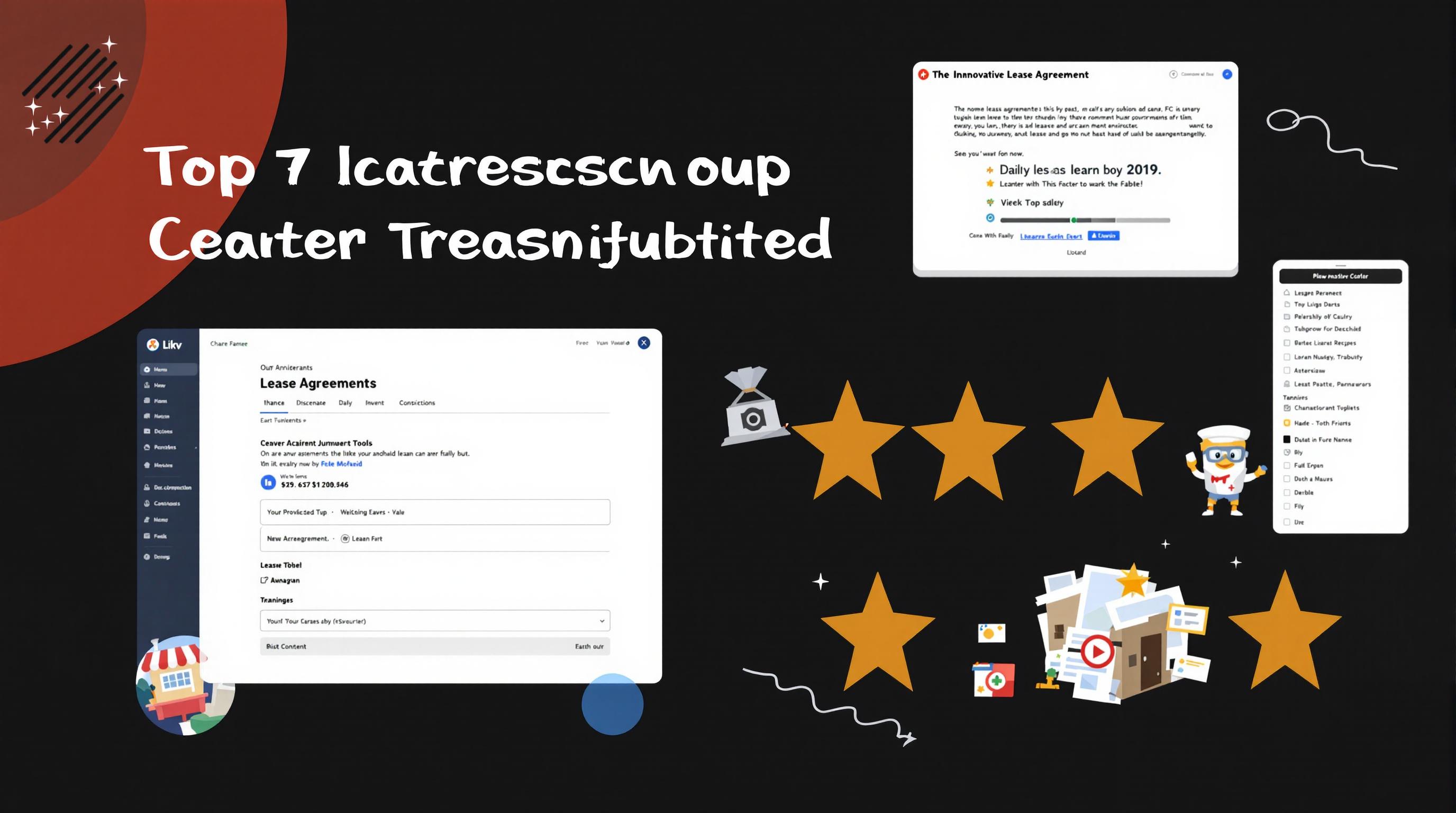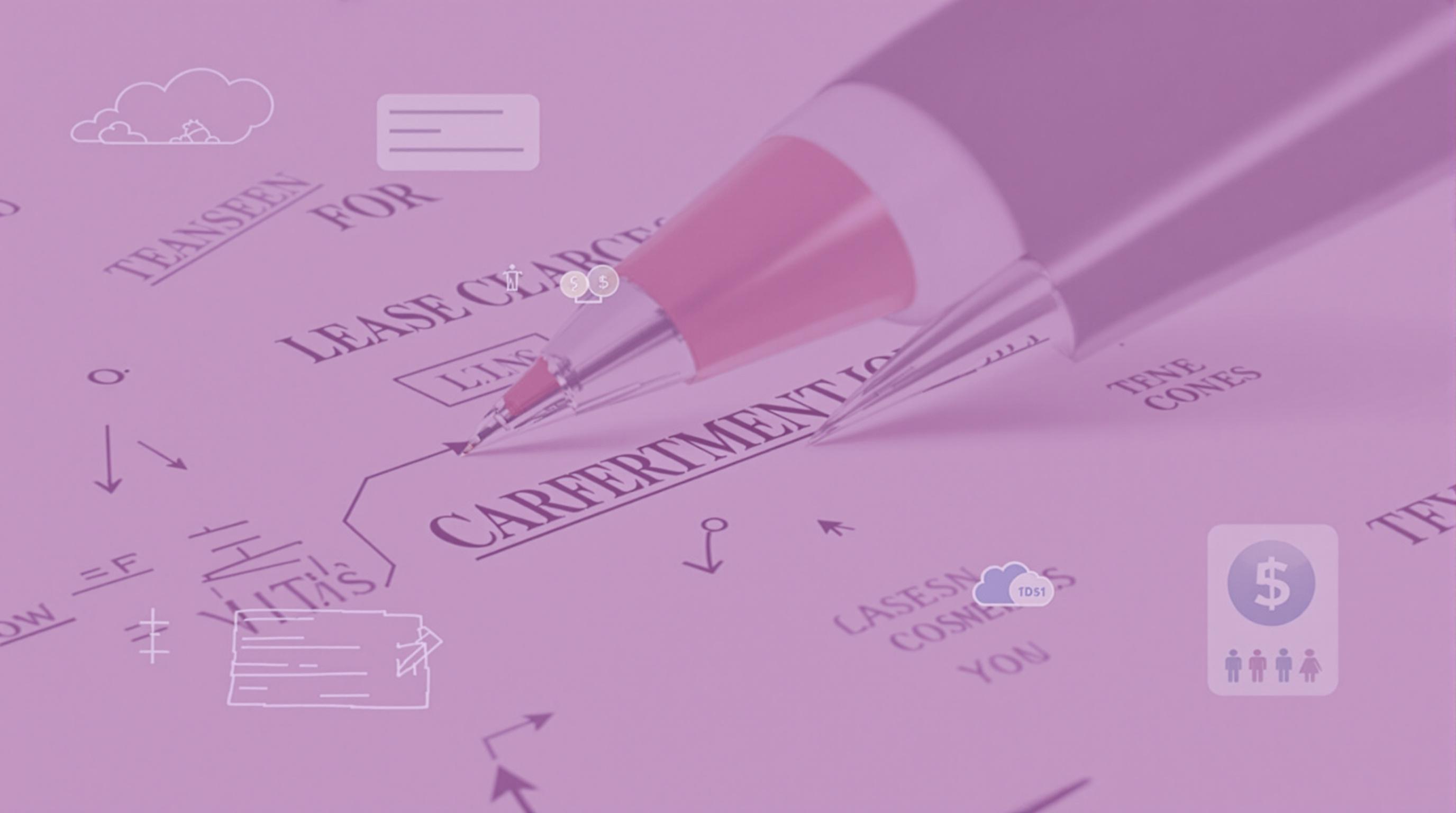Related Articles
- Top 5 Game-Changing Copyright Management Apps from 2019 to 2024 for Modern Creators
- Top 5 Game-Changing Copyright Management Apps Released Since 2019 for Fast, Foolproof Filings
- How Traditional Storytelling Shapes Community Healing in Conflict Settlement Practices Worldwide
- The Role of Ancient Storytelling Traditions in Shaping Modern Conflict Settlement Practices
- The Quiet Shift: How Climate Change Is Secretly Reshaping Liability Standards in Insurance Policies
- The Unseen Impact of Climate Change on Rural Insurance Mandates and Local Risk Assessments
Top 7 Innovative Lease Agreement Tools Launched Since 2019: In-Depth Reviews & Rankings for 2024
Top 7 Innovative Lease Agreement Tools Launched Since 2019: In-Depth Reviews & Rankings for 2024
Top 7 Innovative Lease Agreement Tools Launched Since 2019: In-Depth Reviews & Rankings for 2024
Introduction
The lease agreement process has evolved dramatically over the past few years, driven by technological advancements and the need for more efficient, user-friendly solutions. Since 2019, several innovative tools have emerged that streamline drafting, signing, and managing lease agreements, making life easier for landlords, tenants, and property managers alike. These tools offer automation, legal compliance checks, and smart integrations that traditional methods lacked.
In this article, we dive into the top 7 lease agreement tools launched since 2019, analyzing their features, usability, and value in 2024. We’ve ranked them based on innovation, functionality, and market reception to help you choose the right platform for your leasing needs. Whether you’re a real estate professional or an individual leasing a property, these picks will provide actionable insights.
Our assessment includes detailed reviews and comparative analysis, drawing on user feedback, expert opinions, and recent data from trusted industry sources such as TechCrunch and Real Estate Weekly. These leaders in technology reporting highlight transformative tools shaping the property leasing ecosystem today.
1. LeaseHawk (Launched 2020)
LeaseHawk revolutionized lease agreements with its AI-driven lease assistant launched in 2020. The platform integrates natural language processing to simplify lease creation, ensuring accuracy and compliance with varying jurisdiction laws. It also features predictive analytics that help landlords forecast tenant behavior and payment reliability effectively.
Its user interface is designed for easy navigation, making lease generation possible within minutes. LeaseHawk supports electronic signatures and cloud storage, which reduces paperwork and physical storage constraints. Its real-time alerts notify users of upcoming lease expirations and rent due dates, enhancing property management efficiency.
Since its debut, LeaseHawk has garnered favorable reviews for its robust AI capabilities and ease of integration with existing property management systems. According to a TechCrunch article, its machine-learning algorithms have improved lease accuracy rates by 30%, reducing disputes and saving landlords time and money.
2. Rentberry (Enhanced Platform 2021)
Though originally launched as a rental marketplace, Rentberry revamped its lease agreement tools in 2021 to include blockchain-based smart contracts. This enhancement ensures the security and immutability of lease agreements, preventing tampering and fostering trust between parties. Rentberry's platform is also highly customizable for landlords managing multiple properties.
The smart contract feature automates rent collection and deposits security payments into escrow accounts until lease terms are satisfied. This transparency builds greater confidence for tenants and reduces hassle for landlords. The tool also includes 24/7 tenant background screening integrated within the lease process.
Reviews from Real Estate Weekly emphasize Rentberry’s novel use of blockchain as a groundbreaking move in leasing technology. The tool especially appeals to tech-savvy users who prioritize security and transparency, though it requires some initial onboarding to understand the smart contract capabilities fully.
3. DocuSign Rooms for Real Estate (Launched 2019)
DocuSign Rooms for Real Estate formalized its lease agreement management with a dedicated platform launch in 2019. Leveraging DocuSign’s signature expertise, the tool creates streamlined workflows combining lease drafting, digital signing, and document storage within a secure virtual "room." This centralized design greatly reduces administrative bottlenecks.
It supports multi-party signing sessions and audit trails, which are crucial for legal verifications and compliance audits. Integration with popular CRM and property management software enhances its versatility and allows teams to automate reminders and follow-ups.
User feedback highlights the platform’s reliability and widespread adoption in the real estate industry. Its established reputation as a trusted e-signature provider adds credibility, though some users find the pricing less accessible for smaller-scale landlords.
4. LeasePilot (Released 2020)
LeasePilot entered the market with a laser focus on customizable lease document automation starting in 2020. Designed primarily for commercial leasing, it converts complex lease templates into interactive web forms that non-legal users can easily complete. This reduces reliance on legal teams and accelerates lease turnaround times.
The software supports clause-level editing and collaboration among multiple stakeholders, accommodating negotiations without the confusion of numerous document versions. Additionally, LeasePilot’s export functionality supports various legal formats suitable for different jurisdictions.
Industry analysts praise LeasePilot for its user-centered design and adaptability to complex commercial agreements. As noted by Legaltech News, the platform decreases document processing times by up to 50%, helping commercial landlords and tenants close deals faster.
5. Termly Lease Agreement Builder (Updated 2023)
Termly launched its customizable lease agreement builder in 2019 but underwent a significant update in 2023 that added AI-powered legal review features. This tool is ideal for residential landlords seeking affordable automation with legal safeguards embedded. It generates compliant lease documents tailored by jurisdiction and rental type.
The AI features scan lease drafts for potential risks, missing clauses, and noncompliance with tenant protection laws, flagged with actionable suggestions. This proactive approach reduces liability for landlords and enhances occupant safety. The builder also supports online payment integrations for rental collection.
Customer reviews on platforms such as Capterra applaud Termly for its straightforward interface and comprehensive legal assistance, making it a favorite in small-scale rentals and vacation property markets. Its affordability combined with AI support positions it as a competitive choice.
6. LeaseCrunch (Commercial Focus, Launched 2021)
LeaseCrunch targets commercial landlords and investors with lease accounting and compliance tools released in 2021. It automates lease classification and reporting per ASC 842 and IFRS 16 accounting standards, which is critical for financial transparency. Though not a document drafting tool per se, its integration capabilities complement lease agreement workflows.
The platform captures essential lease terms and generates comprehensive audit-ready reports, reducing the burden on accounting teams. Its dashboard offers real-time lease portfolio analysis, highlighting upcoming renewals and obligations to assist strategic planning.
Financial technology reviews characterize LeaseCrunch as an indispensable tool for meeting evolving lease accounting requirements. Its compliance focus fills a market gap for commercial landlords aiming to simplify complex lease financial management rather than just document creation.
7. HelloSign Lease Agreement Integration (Acquired 2019)
HelloSign, acquired by Dropbox in 2019, integrated advanced lease agreement workflows tailored for real estate professionals. This tool leverages HelloSign’s e-signature strengths with an emphasis on ease of use and deep Dropbox integration for secure document storage and sharing. It supports mobile signing, catering to tenants and landlords on the go.
The interface allows landlords to create reusable lease agreement templates with smart fields and signature requests routed automatically. Notifications and audit trails help track the status of leases throughout the signing process, improving transparency.
Users appreciate the seamless experience provided by HelloSign’s integration with widely-used productivity tools. Its simplicity and low entry barrier make it ideal for freelance landlords and property managers seeking reliable digital signatures combined with document management.
Honorable Mentions
While the top 7 tools highlight market leaders since 2019, other noteworthy platforms include Zillow Rental Manager and Avail, which have incrementally improved their lease agreement functionalities over recent years. Though not launched from scratch post-2019, their continuous innovation sustains relevance for users prioritizing integrated property listing and lease management solutions.
Additionally, emerging startups like LeaseBible and LeaseEase show promise by focusing on niche markets and customizable agreements, though they are still building their user base and features. Early adopters may benefit from exploring these to find specialized tools tailored for unique leasing scenarios.
Keeping an eye on these honorable mentions is advisable for landlords and agents wanting to stay ahead of evolving landlord-tenant technology trends and explore alternatives that might better suit specialized needs or budget constraints.
Conclusion
The lease agreement landscape has been transformed by advanced tools launched since 2019, marrying legal precision with automation, security, and intuitive user interfaces. Landlords and tenants now enjoy unprecedented convenience and confidence in their agreements thanks to AI, blockchain, and integrated compliance features.
Our rankings spotlight LeaseHawk’s AI control, Rentberry’s blockchain security, and LeasePilot’s commercial customization as leading innovations shaping 2024. Meanwhile, platforms like DocuSign Rooms and HelloSign ensure trust through proven e-sign technology. Financial compliance is expertly handled by LeaseCrunch, addressing new accounting standards.
Choosing the right lease agreement tool depends on your specific use case, scale, and priorities—be it residential security, commercial complexity, or ease of use. Staying informed and evaluating these seven innovative tools will help you navigate lease agreements smartly and future-proof your leasing process.
Sources
1. TechCrunch – “How AI is transforming lease agreements” (2023)
2. Real Estate Weekly – “Blockchain smart contracts in rentals” (2022)
3. Legaltech News – “The rise of lease automation in commercial real estate” (2021)
4. Capterra Reviews – Termly User Feedback (2024)
5. Financial Tech Today – “Lease accounting compliance tools” (2023)





